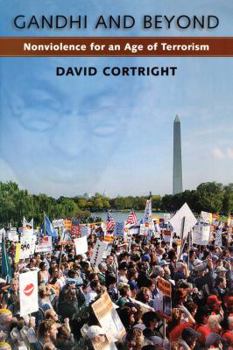Gandhi and Beyond: Nonviolence for an Age of Terrorism
Select Format
Select Condition 
Book Overview
Is there room for nonviolence in an age of terrorism? Drawing on the legend and lessons of Gandhi, Cortright traces the history of nonviolent social activism through the early 20th century to the civil rights movement, the Vietnam era, and up to the present.
Format:Paperback
Language:English
ISBN:1594512663
ISBN13:9781594512667
Release Date:September 2006
Publisher:Routledge
Length:276 Pages
Weight:0.85 lbs.
Dimensions:0.8" x 6.0" x 8.9"
Customer Reviews
5 ratings
good service
Published by Thriftbooks.com User , 15 years ago
I needed this book for a class and myschool ran out, i needed it promptly...and it was delivered in less then a week:)
Great in helping understand the field of peace and justice.
Published by Thriftbooks.com User , 16 years ago
I read this book for a peace and justice class at Michigan State University. The book is great in helping understand the field of peace and justice. David Cortright does a great job in keeping the book interesting and understandable.
Active non-violence in an era of terrorism
Published by Thriftbooks.com User , 18 years ago
A great review of the impact of Gandhi's active non-violence and its implications for todays age of terrorism and proactive war. A reminder of the benefits that could happen if we really tried active non-violence, as people, as communities, as a nation. What a world it would be. Thanks to the author for reminding us of the possibilities. Mary Nelson
Civil Disobediance: More than a Tool of Saints.
Published by Thriftbooks.com User , 18 years ago
What I appreciated about this book most is that it told the "rest of the story" about those who have used civil disobedience as a tool to change their governments and the world. These activists were not portrayed as perfect, but rather subject to the human frailties that we all have. Not only did the book offer reminders of how others have used civil disobedience, but reminded us that they were human. This alone made civil disobedience a tool within everyone's grasp. It reminded me that the good fight is one that we can all participate. Before this book, I had put these activists up on a shelf and only loved them for being better than human. After reading this book, I loved them even more for being imperfect like me, which empowered me to more courageously participate in the struggle for justice...even though I too am not a saint.
Very enjoyable and helpful reading on nonviolence
Published by Thriftbooks.com User , 19 years ago
I had two misgivings about this book before I began to read it. Both of my misgivings turned out to be unfounded. The first one was that since I have read my fair share of nonviolence books I feared that it would all be repetition. Cortright starts the book with Mohandas Gandhi and Martin Luther King, but not with the ordinary biographical stories of their lives. Rather he uses them as vehicles to explain the secret of nonviolence together with today's scholars and his own opinions. It works very well and even though Gandhi and King are familiar to me I learned a lot, especially in a later chapter were he writes about Gandhi's and King's views on gender and sexuality. The second misgiving was the subtitle which made me hesitate if I would buy it or not: "Nonviolence for an Age of Terrorism". I was afraid that this was another American too hung up on terrorism; like terrorism was the biggest problem humans face today. As a Swede, living in a country who has not been struck by terrorism or taken part in the "war on terrorism" it might be more difficult for me to understand why terrorism is seen as the biggest problem in the world, when tens of thousands of people are dying every day of poverty. Actually the book doesn't talk very much about terrorism, but poses an important challenge to nonviolent activists. If we want to stop the "war on terror" we ought to be able to provide a better solution to the problem of terrorism than the military does. I have been racking my brain on how we can be more effective in our nonviolent campaigns. This book gave me a lot of food for thought on the subject. But unlike strategists like Gene Sharp, Cortright doesn't limit nonviolence to its effectiveness. He sees nonviolence not just as a method but as a way of life. He tells about his struggles and his times of doubts about the ideas of nonviolence. My respect and admiration for the author rose after I understood how much involved he has been for many decades and still is in the peace movement. Here is a man who not only teaches and writes about Gandhi and King, but actually tries to use their methods in his life. He manages to combines the learnings of the history of nonviolence with the nonviolent movement of today - a potent combination that we need more of. I am sure military analysts sit day in and day out trying to analyze yesterday's battles to learn how to fight more effectively tomorrow. We nonviolent activists have something to learn from the military in that sense. Cortright's book really highlights the importance of making this analysis and to learn from our mistakes. The book gives a refreshing criticism of our nonviolent icons. I had heard negative rumours about Gandhi and King but was unsure if they were true. According to this book some of them were and some were not. But Cortright makes a more important point - you can admire one part of a human's life - like Gandhi's nonviolent struggle against the British occupation while at the same time b






